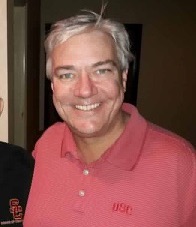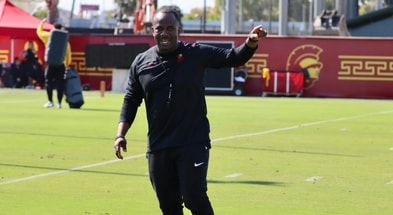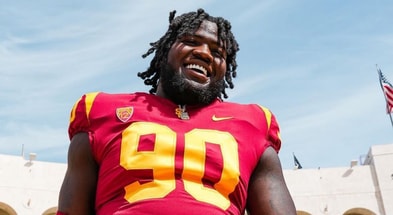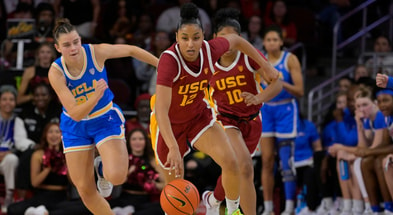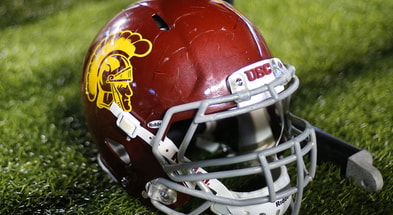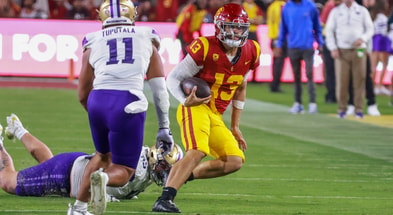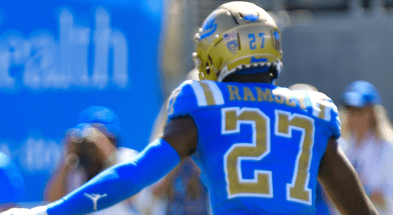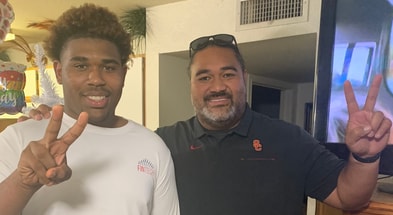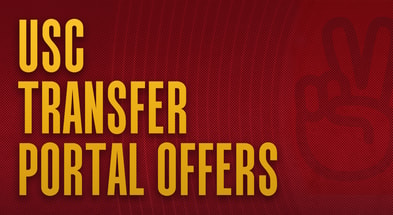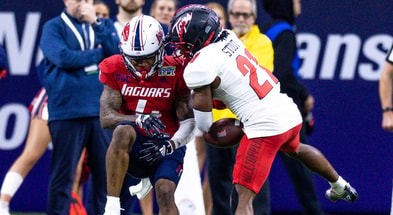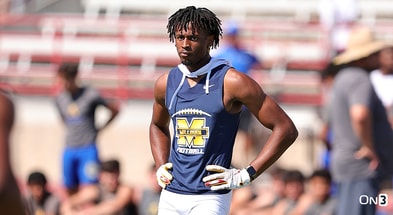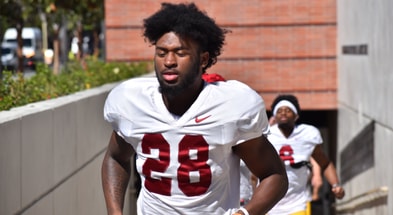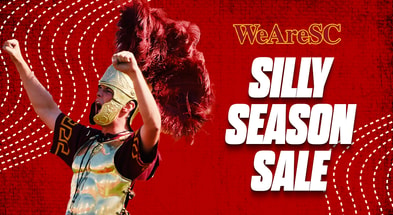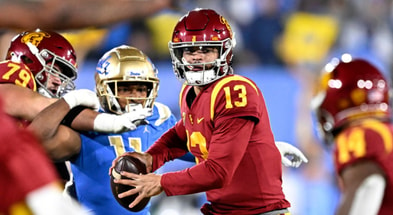by Pete Arbogast, the voice of the Trojans
You are probably a long time Trojan fan, or a historian of the football program if you know well the name and exploits of Fred Hill. #81 in your game program if you happen to have one around the ol’ homestead from 1962-3 or ’64. SE, 6’ 2”, 210, Paramount HS.
I’ve met a lot of Trojans through the years, in fact made a point of meeting as many as I could, some heroes, some just guys on the roster, to get their stories.
I can’t recall exactly, but it was maybe 5 years ago I made Fred’s acquaintance for the first time. I was in Heritage Hall talking with video man Rich Rodriguez about something-or-other and in walked this rather tall, well dressed gentleman asking Rich if he could see a particular piece of film from a game in those aforementioned years.
It was the 1964 Notre Dame game in particular, a game I saw in person (at age 9) and consider myself at least a bit of an expert on. Rich had it waiting for him, popped it in and we all watched as he pointed himself out to a friend or two he had in tow. As he did so, I realized I was standing next to Fred Hill!
I asked if I could call upon him in the future for a where-are-they-now piece for our fair site. He gave me his card and we shook hands and he recognized my name for what it is.
I ran into him once again the following year at the 50-year anniversary celebration before Salute to Troy that August, and got a photo standing between he and Rod Sherman.
I’ve done several of these pieces for WeAreSC.com in the years that followed, but never got around to calling Fred. Until today.
He sounds like a Southern California surfer boy on the phone, so much so that you’d never guess he’s about to turn 72 next month.
“I was recruited by only a few schools out of Paramount….Arizona, Washington State and BYU wanted me as a roll out quarterback.”
“I had been injured most of my high school career—did it while sliding into second in a baseball game, but Dave Levy, who had just come over from Long Beach Poly to join Coach McKay’s staff thought I’d make a good football player and asked me to come to SC.”
He was the last one to get a scholarship offer that year. In fact it didn’t come until midway through his senior season of baseball that spring.
They wanted to put him on the line, instead of at QB, his high school position, since the team already boasted Pete Beathard and Bill Nelson.
In those days of course, freshman could not play varsity sports, so they pretended to be the opposition all season long getting pummeled by the varsity and they prepared for the coming Saturday.
“We actually played our first freshman game that season without one minute of practice.” “We could not, as freshmen, start practicing until we actually started school, and that wasn’t until the next Monday.”
They won the game, but freshman coach Marv Goux—you may have heard of him—was, shall we say, displeased with the efforts of his team, and spent the next week doing nothing but tackling and blocking.
“I was a really good and sure-handed receiver on the frosh squad—if you threw it near me I could catch it.”
His first grab was a 75-yard TD which came after a rare dropped pass on a hot day against Stanford. Tired after the long run, he had to go back out and play on kickoff coverage. Hill was injured and missed the next few games. It was the beginning of an injury marred career.
It was McKay’s second year as head coach at SC. In 1960 the varsity went 4-6 and the 1961 season wasn’t much better, record-wise, at 4-5-1. But they did show improvement losing to #1 Iowa on a missed two-point conversion, and so the Coach got a new lease on life in ’62.
In his freshman year on the diamond that spring, Hill was on a squad that won the national title, one of a record number of titles for the SC men that school year.
It was a great team, and Hill says that quite honestly, Rod Dedeaux was the best coach he ever played for in any sport at any level.
In the summer, he played baseball with the Dodger Rookies locally, in 50 games (non-professional, of course) under the guidance of a beginning manager named Tom Lasorda.
As a soph footballer that year, Hill played behind All-American Hal Bedsole among others.
There were many tight games in the perfect season: a thrilling 14-7 tussle with 8th ranked Duke at the Coliseum, and a 13-7 victory over Roger Staubach and Navy. The Midshipmen fumbled the ball all over the field in a game Staubach still calls the most frustrating defeat in his career.
Had Navy and not USC won the game, they would have likely been the National Champs.
There was a game against Iowa that was scoreless late in the 4th quarter. The Hawkeyes had to kick from their own end, and the snap went high over the punter’s head.
“I was pretty fast, and chased him a best I could but he got off a miracle line-drive punt that went back out to mid-field.” “One more step and I had him and we win on a safety, instead we drive for a winner near the gun.”
It would not be Hill’s last brush with greatness.
**
In the early part of the ’62 campaign, Hill suffered a terrible dislocation of the elbow that kept him the better part of the season.
His recollections of the undefeated national championship season were good but, “I just remember wanting to play so badly, and I couldn’t.”
He returned in time to help the team shut out Darryl Lamonica and Notre Dame at the Coliseum 25-0, in game in which he caught a TD pass.
He caught another on New Year’s day 1963 as the Trojans built up an insurmountable 42-14 lead over Wisconsin, before the Badgers came nearly all the way back before losing to the national champion Men of Troy 42-37.
It was during this season that he saw the two sides of Coach McKay—the gruff taskmaster on the field and the funny quipster in front of the fans and media.
The 1963 baseball season was again a good one, but the trip to the College World Series did not go quite as planned.
“We had the best team, but we maybe didn’t, as a team, take it all that seriously and it caught up with us.”
He was drafted by the Red Sox, but was talked out of it by McKay.
“He told me that if I wasn’t injured and played more, I could play in the NFL and be a star in the pros, so I told the Red Sox I was staying in college.”
He did not find Coach Goux much of an inspiration during this time, nor most others.
“He came off as sort of mean, and he picked on guys, I guess to try and make them tougher.” “He was one of the toughest and craziest guys I have ever known.”
Years later, while playing in the NFL, Hill came back to campus to say hello to some of the other coaches but ran into Goux, who called him into his office. There on the wall were pictures of every USC pro football player, including one of Hill. Goux told him he was very proud of all of the guys he coached, and told Hill he was proud of him, too!
“I guess the defensive guys really liked him, but us offensive guys—not so much!”
In the 1963 football season, he roomed with Senior Bedsole.
“I remember seeing him play JC ball as a Quarterback at Pierce when I was in high school, so I looked up to him a lot.”
“He was a really good guy.” “We were both P.E. Majors, and I think in ’62 maybe one-third of the catches he had were for touchdowns…amazing!”
The ’63 team started the season in the number one spot but went 7-3 in a failed attempt to repeat at champions.
Hill did not stay healthy, wrenching his back, and spent much of the season in traction.
Fred decided, for a number of good reasons, to drop baseball from his repertoire.
He got a job working in the Long Beach oil fields, got married and lost 20 pounds in anticipation of his senior football season and, he hoped, beyond.
That fall, the 1964 Trojans were occasionally spectacular and sometimes not that great. The season is captured for eternity on a vinyl long playing album narrated by the late Dr. Frank C. Baxter with highlights from the Voice of the Trojans, Tom Kelly.
Hill led the team in receptions in 1964, catching 33, one shy of the school record for a single season, and he roomed with a quiet and tough young running back named Garrett.
It was an up-and-down year for sure. In the Washington game, Hill seemingly had a game-winning TD pass in hand just before the safety came over and jarred the ball free, giving the Huskies the win. If SC wins that game, they end up in Pasadena on New Year’s Day. Instead they tied for the league title with Oregon State.
It was an unbalanced schedule in those days, and while the Trojans were losing to the Dogs, the Beavers were wiping out Idaho by a final of 7-6.
The conference presidents were set to vote Oregon State into the Rose Bowl, but SC still had a game to play against the top ranked and undefeated Notre Dame fighting Irish at the Coliseum on the season’s final day.
The conventional wisdom said that if the Trojans, with a record of 5-4 overall, could somehow defeat the Irish, then they would gain enough support to be the conference representative in Pasadena.
“We absolutely though that if we won, we would go.”
At halftime ND led 17-0, but McKay was calm.
“He told us we were playing well enough to win the game, and if we just got some better luck and shut them out in the second half we could do it.”
“I caught a ball for a score in the mid-fourth quarter to cut the lead to 17-14, and we all knew it was a possibility.”
“By this time, we were basically improvising plays on the sideline.” “I would go in basically every other play with the instructions.”
“Coach said: Hill, you’re the split end but line up tight to the tight end and run a shallow cut across then turn up and you’ll be wide open…and I sure was!”
“Fertig hit me with a lob pass I had to wait for and instead of an 80 yard TD I got stopped at the 50.”
After the Trojans held the Irish on their next possession, Garrett returned a punt to the ND 40-yard line, and the Trojans were in business.
On second down, the coach said: “Have the Tight End knock the Linebacker over to the center of the field, you line up right next to him and follow him out but curl the other way.”
He did and the result was a 23–yard pickup to the 17.
Two plays later: “He told me to tell Fertig to hit me on a post pattern on second down. Craig threw it just a bit too high. I jumped as high as I could and grabbed it laying flat out.” “I came down with most of my body in the end zone, but my elbows hit the out of bounds marker and the ref thought I was out.”
No TD, and no glory. A catch there might have given ND QB John Huarte just a few more seconds he might have need to rally his team to victory before the final gun, but it also could have made Hill one of the all-time heroes of USC football history.
Instead, after the next play during which Fertig was hit as he tried to throw and dropped the ball (ruled an incomplete pass), history was made by someone else.
“I had been standing next to McKay the entire fourth quarter if not most of the game, and up runs Rod Sherman and tells the coach he can get open on the 84-Z-Delay…..and McKay sends him in!” “If I had said it…..”
“I’ll tell you this, it took a lot of guts for Sherman to call his own number, and he made a great call.”
Fertig’s throw over the middle was on the money, The ND defender, All-American John Carey wore uniform #1 and he fell over and so did the Irish #1 ranking, and Sherman was the hero.
Rod, as you may know, suffered a major stroke a few years back and is still struggling to recover.
The game ended not long after and the jubilant Trojans made there way to the locker room to continue their celebration.
Until word came down that the conference president’s had voted Oregon State into the Rose Bowl anyway. The deciding vote was cast by UCLA.
Oregon State got crushed by Michigan and they haven’t been back since.
And just like that Hill’s college career was over.
He did get to go to play in the Shrine game and the Hula Bowl, and played in the College All-Star game against the NFL champion Cleveland Browns that featured Jim Brown. Among his teammates in the all-star games were some other “decent” players heading for the pros: Gale Sayers, Dick Butkus, Staubach, Huarte and the fastest man in the world Bob Hayes.
That spring he was wooed by the Oakland Raiders of the upstart AFL, but drafted in the 4th round by the Baltimore Colts, traded quickly to Philadelphia where he played his entire 7-year NFL career.
Some years were better than others, and in those others he was, as he often was in college and high school, to injured to make much of a mark.
Case in point: playing in the All Stars vs. Browns game he broke his ribs and missed most of his rookie season.
During the middle of his pro career two important things happened.
One, football related, was that the Eagles lost their first 12 games, then won, lost again and in the final game of the year had a chance to finish with the worst record in the league, but won in a rain storm on three field goals. The win cost the Eagles a chance at O.J. Simpson.
The other happened off the field, as his 3-year old daughter Kim was diagnosed with leukemia and began almost daily cancer treatments.
It was a tough burden for Hill and his wife Fran, who had known each other since they were 6 in elementary school, and began dating in junior high.
By the time his playing days ended in 1971, his teammates along with Eagles management rallied around the family and in the wake of her successful treatment initiated a philanthropic program for area children and their families.
It started with a small effort to raise money for research that involved players wives holding a fashion show that brought in about ten grand.
When new owner Leonard Tose got wind of the situation, he held a similar event at Veteran’s Stadium that raised ten times that.
Then they decided to pass the hat at games to raise more money, held a radio-thon, opened a phone bank where fans could talk to players for a donation and other ideas were added.
Not long after, fast-food company McDonald’s was test marketing green milkshakes for St. Patrick’s Day just in the Pennsylvania area, and said they’d donate 25 cents of each sale towards the movement, by now called “Eagles Fly for Leukemia”.
McDonald’s asked for naming rights, and called their new venture “Ronald McDonald House” which would house families for free when they were near a hospital that was treating their child.
The first one, in Philly, had 6 rooms.
Now there are 350 Houses in 60 countries, many with 100’s of rooms.
Hill kept helping at the Houses, something that fills his days still, along with owning three McDonald’s franchises in Orange County.
His daughter Kim, one of three girls he and Fran had, went into remission and lived 40 more years and had a son, but developed brain tumor problems as a result of her early treatments. She passed away in 2011.
But her memory lives on in the Ronald McDonald Houses. The community around each House is tremendously supportive, and there is a “Kim Hill Award” for the best House in the country each year, and now there’s even a “Fred and Fran Hill” Award to go with it.
Along with his work with the McDonald’s folks, Hill has another passion.
“I live and die with SC football…never miss a game sitting on the SC side with friends and family and listening to every game on the radio in the stands or at home.”
“We ought to be very good this year, I’m excited to get it going!”
For Fred Hill, a fine football player who very nearly was a hero of a very big game, he became a hero of a very different sort in his post-playing days, the type of hero that can make all Trojan fans proud of his contribution to making the world a better place.
Garry Paskwietz (1966-2019)
Garry Paskwietz was a pioneer in bringing team-specific sports coverage to the internet. He founded WeAreSC in 1998 and was an Emmy winner for his work with Fox Sports West. Always generous with his time, knowledge, and compassion, he touched the lives of countless USC and high school football fans.
